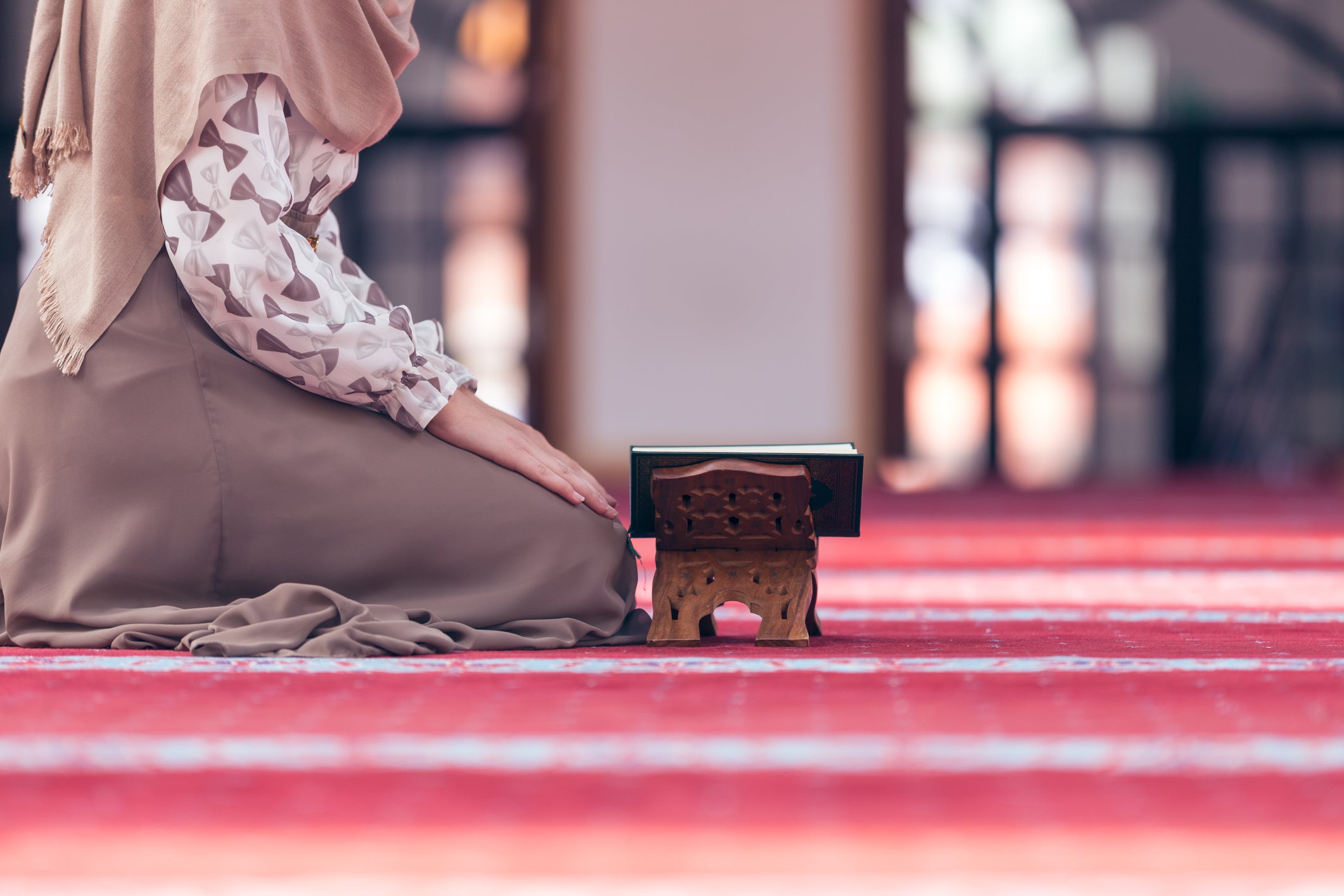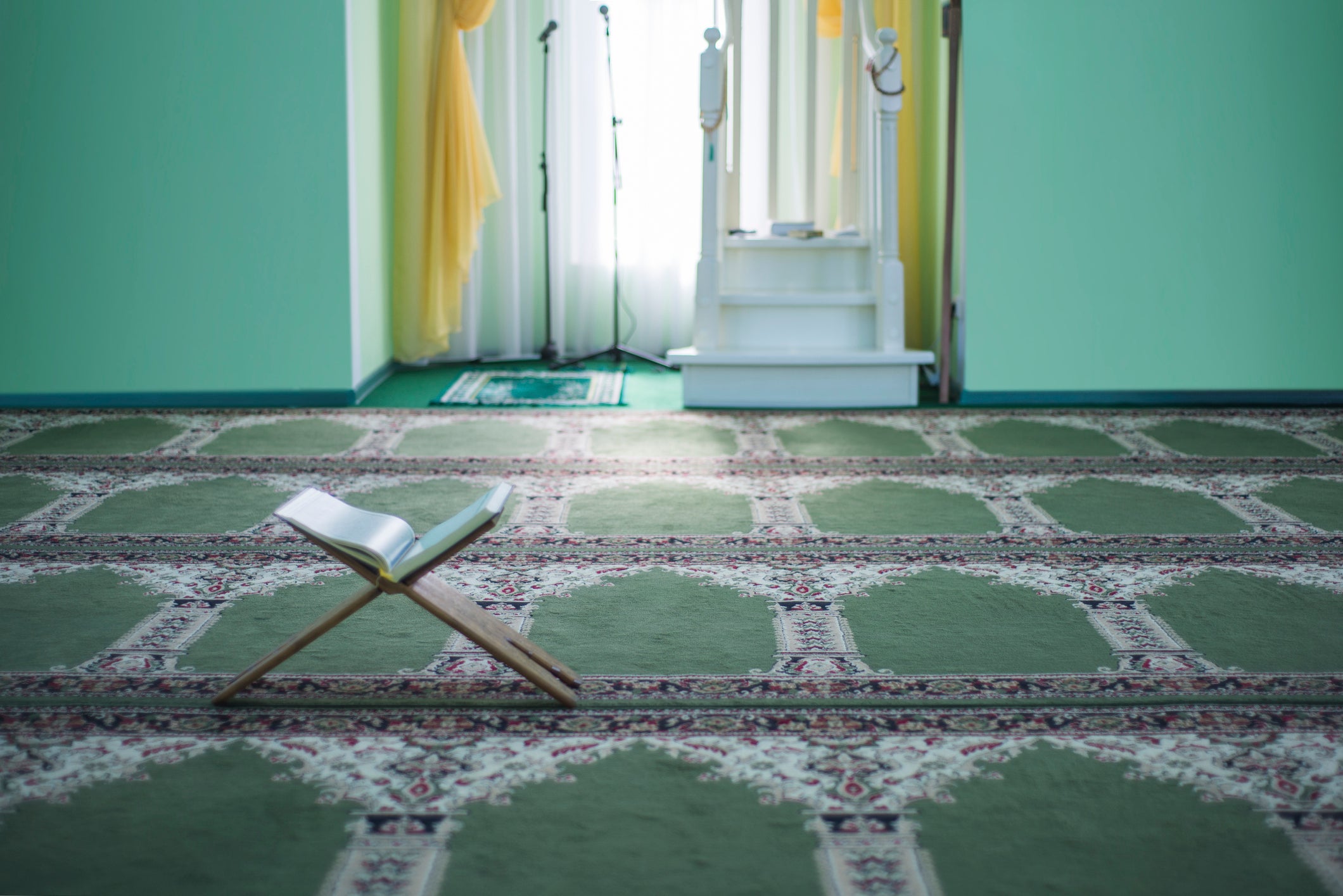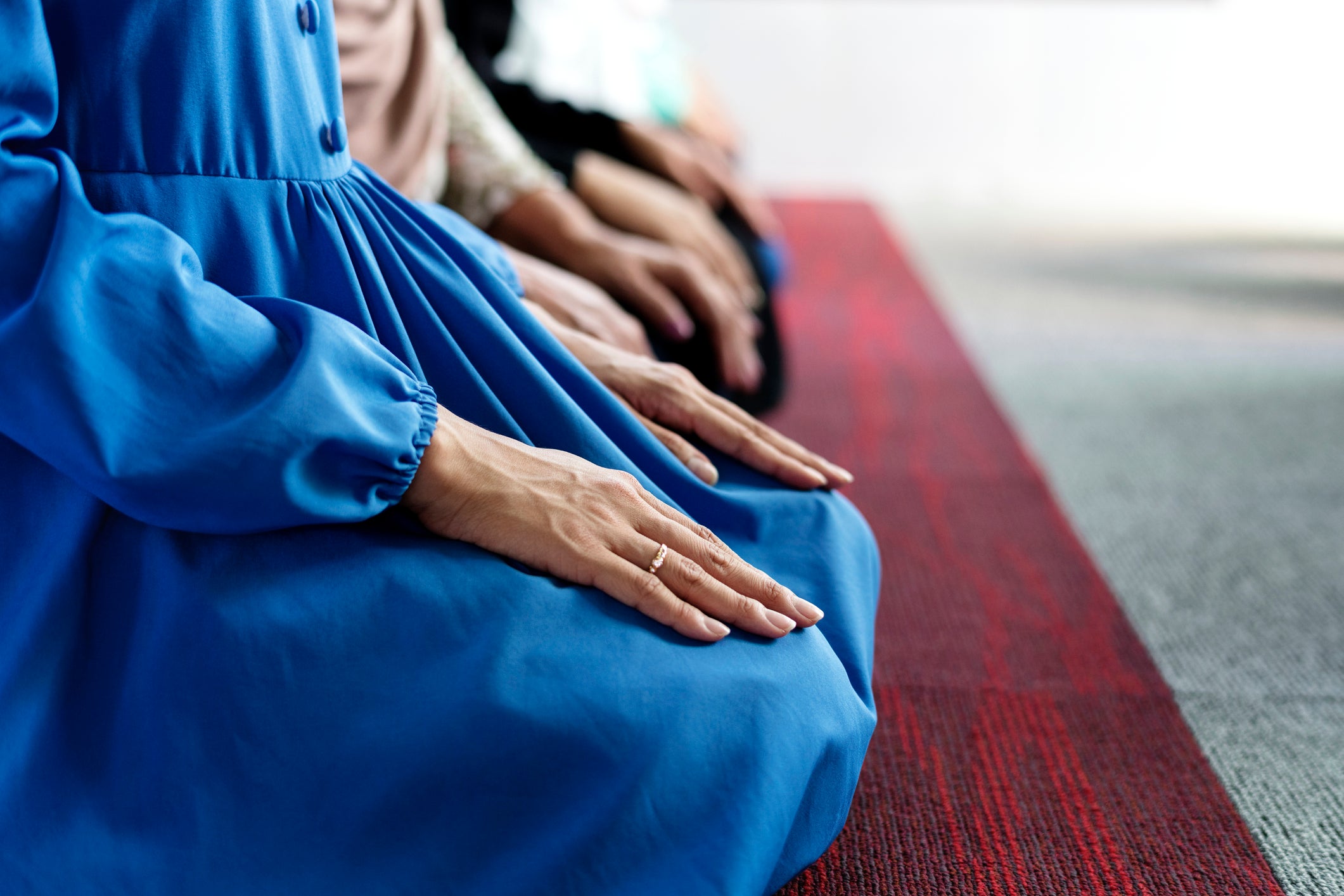
I could count the number of times that I’ve prayed in a mosque on both hands. I could count the number of times I’ve prayed in a mosque in the UK on just one finger. The city I grew up in has had a mosque for as long as I can remember, and in recent years it has more than doubled in size. But if you were to ask me about this worship space I’m supposed to call mine, the truth is I couldn’t tell you anything about it. I imagine the carpet in the men’s area is soft, and that the prayer mats are jewel-toned and decorative, and that it is bright and airy. Then I think of the women’s section, and my memory casts me back to a dimly lit, small room I prayed in on only one occasion. Among dozens of women huddled together in the tight space, I tried to finish my prayer as quickly as possible as I knew plenty more were waiting outside.
Like many women across the UK, I don’t feel comfortable going to a mosque. It’s not because I have had a negative experience, or that I’ve been turned away. It’s certainly not because of anything decreed in Islam – a religion that champions the rights of women and gives them equal status to men – it’s because I grew up with the internalised belief that mosques were spaces for men. While my father and my brothers would attend the local mosque every week, my sister and mother never did, and I never questioned why.
As per the latest statistics, compiled in 2017, there are approximately 1,795 mosques across the UK. Of these, 72 per cent were found to have facilities for women. While this figure may seem promising, it is mostly a reflection of smaller factions of the UK’s Muslim population. The two different branches in Islam are the Sunni and Shia sects. Under each sect there are various schools of thought due to how the religion has been interpreted by scholars over time. Most Muslims in the UK follow the Hanafi Deobandi teaching, which falls within Sunni Islam. Of the UK’s mosques, 796 of these are Deobandi, but just 49 per cent of these have facilities for women.
Where mosques do cater to women, the quality of these facilities greatly vary across the country. Some mosques only permit women for prayers during key events of the Islamic calendar, such as Ramadan or Eid. This contrasts with services for men, who are welcome to pray each of their five daily prayers in the mosque every day of the year. Muslims of Britain, a directory of UK mosques, also notes in its research that some of the facilities for women may be passed over to men during busy periods, and that some spaces are inaccessible to those with limited mobility.
It is largely accepted that during Prophet Muhammad’s (PBUH) lifetime, both men and women prayed in the same space, but in separate lines. Today, most mosques have interpreted this segregation as a need for separate areas for the sexes. However, prayer spaces for men are often far larger and better kept in comparison to women’s areas.

This was recently highlighted by a group of women who visited Brick Lane Jamme Masjid. Sharing details of their experience online, they described plush carpets, grand chandeliers and two spacious floors for men, which were directly accessible from the entrance on Brick Lane. The women were instructed to walk down a flight of metal steps, past the mosque’s funeral service, to reach what they described as “an underground shelter with a bit of carpet in it”. A far cry from the men’s area, the “very small and very stuffy” room had a low ceiling and resembled that of a basement. The group said the experience was “degrading, disappointing, embarrassing and anger-inducing”.
Although this recount is not unique and the problem persists across many parts of the UK, the quality of facilities is not the only barrier Muslim women face when visiting their local mosque. For decades, many mosques in the UK have been seen primarily as spaces for men. This is largely due to the belief that going to the mosque is obligatory for men – they must pray Jummah, the Friday prayer, in congregation – while it is optional for women.
Faiza Hussain*, 22, from London, recalls being shouted at and being asked to leave a mosque by a male staff member. Hussain had been out for dinner with friends in the Paddington area when the group sought a space to pray in. Like the mosque in Brick Lane, the women were guided down a “dark, narrow” staircase into a basement room. “The carpet was damp and felt like it had been flooded,” she says. The women’s facilities for wudhu – the cleansing of the body Muslims must perform before prayers – were also in poor condition and hadn’t been maintained. The area was so poorly lit that one of the group members almost slipped and fell. Shortly after the women began praying, they were interrupted by a male staff member. “He came into the female prayer area and started yelling at us. He told us we needed to leave, because it is better for women to pray at home.”
I’m a confident woman, I’m a professional, I speak at conferences. But it doesn’t feel like it’s my space, it feels like a space that belongs to men— Nahim Ruhi-Khan
While this view, put forward by the staff member, is not universal, it is largely accepted by most Deobandi mosques. And with Deobandi mosques making up most of the worship spaces in the UK, this has had a lasting impact on how women feel about attending their local mosque. The belief comes from a hadith – records of sayings or traditions from the time of Prophet Muhammad (PBUH) – that says it is more beneficial to a woman to pray at home. However, other hadiths state that women should not be prevented from going to the mosque and that prayer in congregation is preferred.
Nahim Ruhi-Khan, from Leeds, travels past the three closest mosques to her home before reaching one which feels most welcoming for women. There is even one mosque within walking distance of where she lives, but she doesn’t feel comfortable attending alone. “There is space, and you can pray, but do I feel able to go if I don’t have my family, or another woman with me? The answer is no,” she tells The Independent. “I’m a confident woman, I’m a professional. But it doesn’t feel like it’s my space, it feels like a space that belongs to men.”
This is echoed by Rizwana Babar*, 36, who says that if she’s outdoors in an unfamiliar place and needs to pray, “the mosque is not the first place I think of, because I don’t know if it will have a space for me”. “There’s no worse feeling than being turned away from a mosque. There may also be that embarrassment of accidentally going through the men’s section and getting funny looks,” she explains. “My relationship with mosques in general is not amazing, and my first thought is usually to either go home and pray or go in a shop and use their changing room.”

Ruhi-Khan and Babar’s experiences were reflected in a March 2022 report by Vibrant Scottish Mosques, an organisation that campaigns for the inclusivity of women in mosques. It found that “the overwhelming majority of women felt the mosque was a male dominated space and one in which they can be made to feel unwelcome and unwanted”. For some, this feeling of isolation starts at the mosque door. Julie Siddiqui, from Slough, visited a local mosque during Ramadan and was told by a man at the main gate that the woman’s entrance was around the side, and down a dark alleyway. “It was horrible. I didn’t want to walk down there on my own,” she says. “The whole geography, the whole mindset is geared around men. And that needs to change.” Siddiqui says some of her experiences in mosques have left her feeling like a “burden”. “Being given a second-rate space, where you don’t know where the direction of prayer is, or whether the Imam has started reciting or not, it’s horrible. It feels so upsetting. And then people wonder why women aren’t coming to the mosques,” she adds.
Contemporary research on women’s spaces in UK mosques is lacking. Open My Mosque, an initiative that documents the good and bad experiences of using UK mosques, recently surveyed more than 300 male and female British Muslims on improvements needed within mosques. According to interim findings shared with The Independent, 75 per cent said mosques must change to become more welcoming for women, while 45 per cent said they themselves, or someone they know, have had at least one negative experience at a mosque due to being a woman. Additionally, 85 per cent said they want prayer spaces for both men and women that are always available – not just on key Islamic dates – while 68 per cent said they believe mosques do not adequately understand female worshippers’ needs.
The way these modern day mosques are operating, it’s actually undermining what Islam is and it ignores women’s voices— Anita Nayyar, Open My Mosque
Anita Nayyar, co-founder of Open My Mosque, says it shouldn’t be taken lightly how important it is for women to have a space to pray. Muslims are required to pray five times a day, as a fundamental pillar of Islam. “Our research showed that it is the number one thing people want to be able to do,” she says. “There’s an anxiety that comes with missing a prayer. When you can’t access a mosque, and you don’t have anywhere to pray, that’s damaging to our spiritual wellbeing. At the very least we should be able to do that, because that outlines our day, and it connects us to God.”
When it comes to shifting the mindset towards inclusivity, the Covid-19 pandemic somewhat provided a helping hand. As lockdown shuttered worship spaces across the UK, many men realised the impact of not having a communal space, says Sahira Dar, founder of Vibrant Scottish Mosques. “Men suddenly realised the mental wellbeing that mosques provided, but as women, we’ve always known we didn’t have that. While men felt the void that the pandemic brought, imagine the void in women’s lives the rest of the time. It was a real learning opportunity.”
Women across the UK – myself included – have grieved this absence of community, but many are reluctant to speak openly about the issue. Some fear that shedding a negative light on mosques could fuel a false, Islamophobic perception that Islam opresses women. Their concerns are not without merit; Islamophobia is still rife, and Muslims were the target of 2,703 religious hate crimes in the year ending March 2021 – 45 per cent of all those recorded in the UK that year. Additionally, a report by Muslim Council of Britain’s Centre for Media Monitoring found that 60 per cent of online articles portray Muslims in a negative light.

But this reluctance to speak out “provides a kind of protection for the mosque leaders who discriminate against women,” says Nayyar. “Islam says Prophet Muhammad’s (PBUH) mosque didn’t put women in a second-class space. There were equal spaces for both men and women.” She adds: “The way these modern day mosques are operating, it’s actually undermining what Islam is and it ignores women’s voices. We are fighting for the rights that we were given, and we are seeing in our research that men also want the same. But it’s a very small minority of men with a particular ideology that are stopping women from going to the mosque.”
Women’s groups believe the key to making worship spaces more inclusive is increasing the presence of women on mosque advisory boards and committees. While data on the number of women in governance of mosques is lacking, experts say it is “extremely rare”. Raghad Altikriti, chair of the Muslim Association of Britain, says individual mosques need to appoint women to evaluate whether their facilities are sufficient. “We can’t have a man saying, well, we think we are catering to women. It should be a women’s committee that can assess the situation and see what is missing. There are always going to be gaps, and there has to be the engagement of Muslim women to see those,” she says. This is supported by the Muslim Council of Britain, which says it is encouraging “more constructive dialogue and solution-focused approaches to ensuring increased access and opportunities for Muslim women."
As with many women’s issues, concrete improvements can only happen when men also take steps towards change. Following the complaints against the mosque on Brick Lane, board members have overhauled the women’s space. Those visiting the mosque must no longer walk past the funeral service, or through a dark corridor to the basement floor. “The women’s entrance is now right next to the men’s, and there are stairs which directly take you to the prayer area,” Maruf Ahmed, an imam at the mosque explains, adding that he is hoping to recruit women to the advisory committee in the near future. The change is already having a ripple effect. While the mosque previously saw groups of just three or four visit for Eid prayers, earlier this month they welcomed a congregation of 50 women.
As for me, my local mosque recently expanded to create a dedicated women’s space. The area has a signposted entrance, wudu facilities, and is open for all daily prayers. I’m hopeful that the development will provide a space of commune for women, and young girls will grow up with a worship space that I never had. And I’m hopeful that, because of this, one day soon I’ll finally be able to shake the familiar feeling of isolation from the mosque that I’ve come to accept.
*Names have been changed







